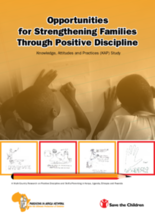childrens_living_arrangement
children_living_without_bio
Displaying 41 - 50 of 70
This study examines whether parental migration can affect health and cognitive ability of left-behind children aged at 5-8 years old in Ethiopia, India, Peru, and Vietnam.
The goal of this final evaluation is to build on the mid-term review of a 3-year pilot community project established to address some of the push factors that were leading many children to come to the city of Addis Ababa from Ethiopia’s southern region (SNNPR).
This literature review explores current international and selected national policy on independent living arrangements and examines the evidence of good practice from existing independent living programmes for care leavers in order to assess how both of the above can be applied to street-connected children.
This interpretive study examines the experiences of 54 Ethiopian emerging adults who had aged out of institutional care facilities.
This study sought to understand gender differences in potentially traumatic events (PTEs) in orphaned and separated children in 5 low- and middle-income countries (LMIC): Cambodia, Ethiopia, India, Kenya and Tanzania.
This study intended to develop data regarding how families parent and nurture good behaviour in their children; whether they know what would constitute nonviolent (positive) discipline; and if they actually utilized the positive aspects of disciplining. The study was conducted in specific areas (study clusters) in Kenya, Uganda, Ethiopia and Rwanda.
This interpretive study examines the experiences of 54 Ethiopian emerging adults who had aged out of institutional care facilities. Findings are derived from interviews and focus groups in which questions and activities focused on the challenges faced by participants and the supports they relied on throughout the transition process.
This article details the introduction of a livelihood project for unaccompanied children in the Dadaab refugee camp in Kenya, which aimed at strengthening the household economy of foster families and improving the care of fostered children.
This presentation from Innocenti’s Expert Consultation on Family and Parenting Support describes gender roles in parenting in Ethiopia, the missing role of fathers in parenting, legal/policy provisions of family support, and some work being done to engage fathers.
This article uses data collected from adoptive parents’ postadoption and governmental data in Romania, Ukraine, India, Guatemala, and Ethiopia to focus on domestic adoption in each of these countries. The article highlights both promising practices in domestic adoption as well as policies and practices that require additional research.



